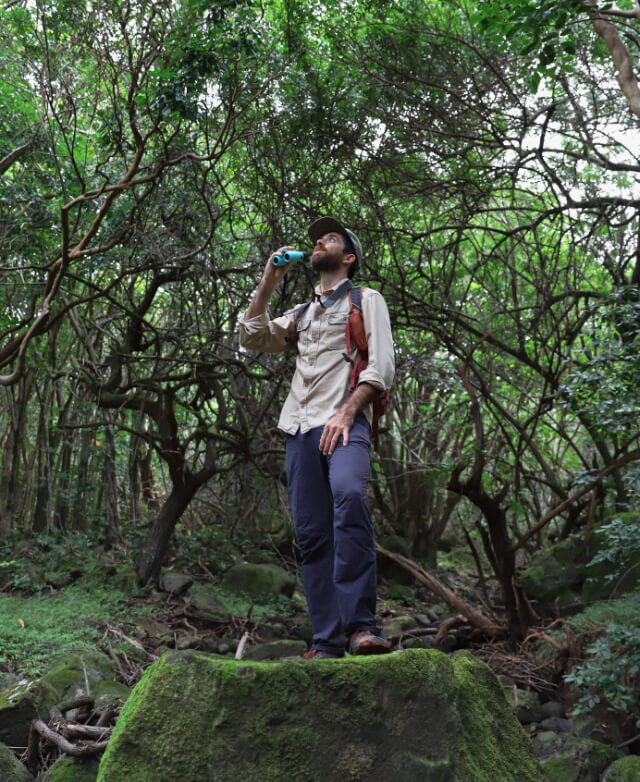Your Name: Peter Kealii Thoene
Age: 33
Where you were born: Kealakekua, Hawaii
Where you live now: Honolulu, Hawaii
Profession: Naturalist Guide
Ethnicity: Native Hawaiian / Caucasian
Quick intro about you and your background:
My name is Peter. I’m from the island of Hawaii. I left the islands in 2006 to experience the world. I lived in a few countries, traveled to a few more, and in 2015 I returned to plant roots.
What is your profession and what was the process in getting there?
I’m a naturalist guide. The path was winding. I’ve done everything from sailing whale watching catamarans, to making wine in New Zealand, to teaching English in Japan.
Eventually, the path led me back home—and to the realization that Hawaii’s natural world is more remarkable, unique, and diverse than anywhere else on our planet. If people like me don’t fight to protect it, it will be gone soon.

How has family and culture influenced your path?
I am part Hawaiian on my father’s side. This has been a huge influence on my path. The Hawaiians were the greatest sailors and ocean navigators humankind has ever seen. When they discovered Hawaii and set up shop, they created a complex society with an incredible environmental ethic.
They were really the first scientists in the islands. They carefully observed nature and hypothesized about these never before observed phenomena like snow on Mauna Kea or lava bursting forth from Kilauea. Can you imagine seeing those things for the first time, with ZERO context? How would you explain them? Well, the explanations the Hawaiians came up with resulted in a society that aimed to leave little more than a gentle ripple on their natural world and environment.
Unfortunately, Western contact brought along a tidal wave of detrimental effects on Hawaii’s natural world. In only 250 years, the Hawaii of my ancestors has become unrecognizable. I want to figure out how to move into the future with lessons from my past.
Can you tell us a bit about your passions beyond “work”?
I love surfing. I love birding and hiking. I love cooking using fresh produce grown on the island, and I try to mostly use ingredients that haven’t been shipped thousands of miles across the sea.
Hawaii’s food system is broken. 90% of our food is imported. And yet, food security, feeding ourselves without depending on imports, is more than possible—we’ve done it before. At its peak, Hawaii fed about 800,000 people without a single import. What happened? Why am I standing in line at Costco? How did this break and how can we fix it? I also skate.


How have binoculars as a tool influenced your profession?
Becoming a naturalist guide was also my introduction to birding. And binoculars are obviously crucial for that. Some of our most enthusiastic visitors are birders. They flock to the islands from around the world for the possibility of a glimpse of our unique bird species.
Our native birds, particularly the Hawaiian honeycreepers, are the single best example of adaptive radiation on the planet. Adaptive radiation is why Darwin went to the Galapagos Islands. He studied 14 species of Finches there—14 different species of finches on 15 isolated islands, all originating from 1 single finch from mainland South America. These finches convinced Darwin that species do evolve over time, which he famously wrote about.
Well, in Hawaii, one single finch-like bird made it here about 3.5 million years ago and evolved into not 14, but FORTY-SEVEN different bird species. Of those, 23 are extinct. The remaining 24 aren’t exactly perching on telephone wires along the freeway. You definitely need binoculars to see them.



At the end of the day, why do you do your craft? Are there goals ahead, constant love for the process, or a yearning to learn more?
My goal for the future is to protect Hawaii from further extinction. Hawaii has the sad title of “extinction capital of the world.” And if we don’t do anything about mosquitoes in the next 5 years, we will have another handful of extinct forest bird species. I plan to turn my focus towards that problem next.
What have been your biggest challenges?
My biggest challenge has been finding my path, trusting that all these world experiences are adding up to something good and haven’t been a waste. Or, maybe my own ego has been my biggest challenge. Accepting myself for who I am and not trying to be the person my ego thinks I need to be.
How can the outdoor industry act to affect change with regard to outdoor recreation and public lands?
There is so much evidence that getting outside is good for our brains, good for our bodies, and good for our happiness. Outdoor companies’ first client needs to be mother nature. Without her, nothing matters at all. These companies have the responsibility to get political, to use their platform to raise awareness and to produce responsibly.
What other brands do you love? Who is hooking you up?
Patagonia is doing cool things with food under their relatively new label, Patagonia Provisions. It’ll be cool to see how their business ethos translates to the food industry and how their purchasing power affects food systems nation- and worldwide.